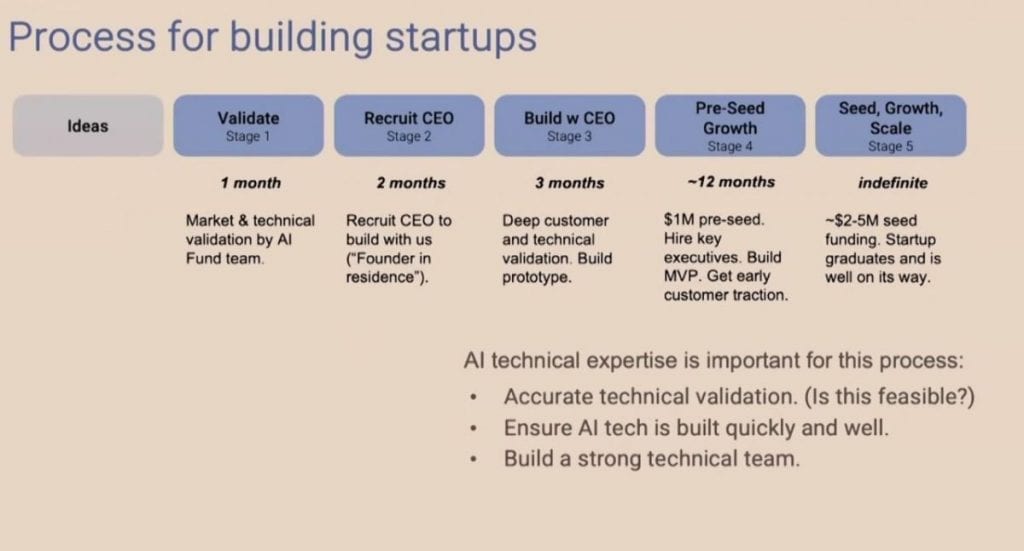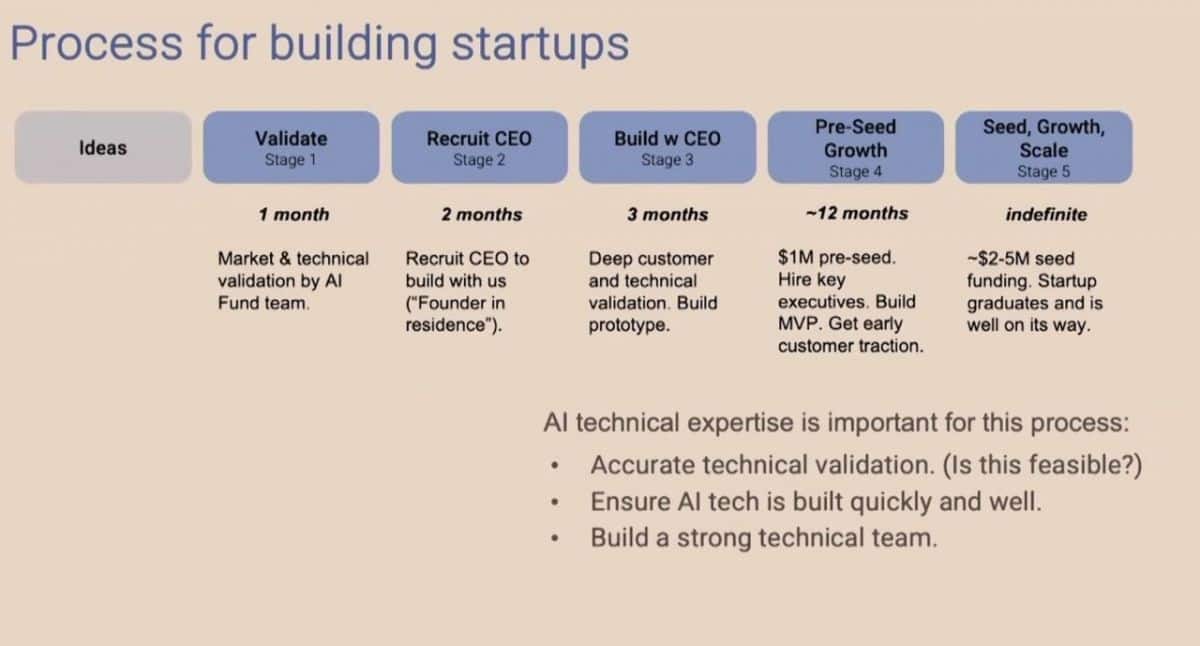[ad_1]


Renowned AI expert and co-founder of Coursera, Andrew Ng, recently shared insights into the well-tested process of building startups in the AI domain. Developed and refined over several iterations, this method provides a roadmap for navigating the complexities of the AI startup landscape.
1. Idea Generation
The first crucial step involves formulating a specific and verifiable idea. Often, these ideas originate from industry experts who can identify problems not apparent to outsiders. An example of a less-than-ideal concept is a vague “AI in finance.”
2. Validation of the Idea (1 month)
This stage focuses on assessing the feasibility of the idea. Key questions include whether similar concepts have been attempted, the market size, and the target customer base. While a well-documented step, its importance cannot be overstated.
3. Hiring a CEO (2 months)
Identifying a CEO is a pivotal task, requiring a person with specialized expertise, industry contacts, leadership skills, and effective decision-making abilities. Although reaching the tier-1 level of managers might be challenging for those not named Andrew Ng, alternative approaches, such as self-immersion or hiring advisors, can prove effective.
4. Building a Prototype (3 months)
Collaborating with the CEO, the team engages in rapid development, continuously revalidating the idea at a more granular level. Simultaneously, a prototype is constructed through swift iterations. Approximately 66% of Andrew Ng’s projects undergo this critical phase, aimed at reaching a stage were attracting clients and securing funding becomes viable.
5. Pre-seed (12 months)
This phase involves finalizing the Minimum Viable Product (MVP), recruiting key managerial roles, and attracting clients. Andrew Ng’s VC injects $1 million into the company at this juncture, providing essential resources for further development.
Following these stages, the conventional trajectory involves capital raising, scaling, and achieving profitability, if not already realized. This well-crafted approach minimizes inefficiencies, accelerates immersion into problem specifics, and maximizes the potential for success in a landscape where AI innovation evolves rapidly.
So I’m curious how the timeline will change as GenAI develops, and how much it can potentially be compressed. It is frequently possible to develop a prototype for client validation more quickly. I know I have a lot of subscribers who are business owners or entrepreneurs. What are your thoughts on this?
FAQs
What is AI startup?
AI startups use AI technologies to create innovative products, services, and solutions in various industries. They disrupt traditional business models and drive innovation. Despite challenges like funding, talent attraction, and regulatory compliance, they have the potential to transform industries.
What kinds of AI startups exist?
AI startups are diverse and focus on various industries and applications. They include AI Technology startups, which develop core AI technologies, AI Applications startups, which build AI-powered applications for specific industries, AI in Fintech startups, generative AI startups, AI in Healthcare, AI in Robotics, AI in Customer Experience, AI in Cybersecurity, AI in Education, and AI in E-commerce startups. The field of AI is constantly evolving, with new startups emerging with innovative ideas and applications.
What is the success rate of an AI startup?
According to a source the failure rate for startups, including AI startups, is estimated to be around 90%. However, it’s worth mentioning that this statistic is not specific to AI startups alone and applies to startups in general.
Disclaimer
Any data, text, or other content on this page is provided as general market information and not as investment advice. Past performance is not necessarily an indicator of future results.


The Trust Project is a worldwide group of news organizations working to establish transparency standards.
Damir is the team leader, product manager, and editor at Metaverse Post, covering topics such as AI/ML, AGI, LLMs, Metaverse, and Web3-related fields. His articles attract a massive audience of over a million users every month. He appears to be an expert with 10 years of experience in SEO and digital marketing. Damir has been mentioned in Mashable, Wired, Cointelegraph, The New Yorker, Inside.com, Entrepreneur, BeInCrypto, and other publications. He travels between the UAE, Turkey, Russia, and the CIS as a digital nomad. Damir earned a bachelor’s degree in physics, which he believes has given him the critical thinking skills needed to be successful in the ever-changing landscape of the internet.

Damir is the team leader, product manager, and editor at Metaverse Post, covering topics such as AI/ML, AGI, LLMs, Metaverse, and Web3-related fields. His articles attract a massive audience of over a million users every month. He appears to be an expert with 10 years of experience in SEO and digital marketing. Damir has been mentioned in Mashable, Wired, Cointelegraph, The New Yorker, Inside.com, Entrepreneur, BeInCrypto, and other publications. He travels between the UAE, Turkey, Russia, and the CIS as a digital nomad. Damir earned a bachelor’s degree in physics, which he believes has given him the critical thinking skills needed to be successful in the ever-changing landscape of the internet.
[ad_2]
Read More: mpost.io










 Bitcoin
Bitcoin  Ethereum
Ethereum  Tether
Tether  XRP
XRP  Solana
Solana  USDC
USDC  TRON
TRON  Dogecoin
Dogecoin  Lido Staked Ether
Lido Staked Ether  Cardano
Cardano  Wrapped Bitcoin
Wrapped Bitcoin  Hyperliquid
Hyperliquid  Wrapped stETH
Wrapped stETH  Sui
Sui  Bitcoin Cash
Bitcoin Cash  Chainlink
Chainlink  LEO Token
LEO Token  Stellar
Stellar  Avalanche
Avalanche  Toncoin
Toncoin  USDS
USDS  WhiteBIT Coin
WhiteBIT Coin  Shiba Inu
Shiba Inu  Wrapped eETH
Wrapped eETH  WETH
WETH  Litecoin
Litecoin  Hedera
Hedera  Binance Bridged USDT (BNB Smart Chain)
Binance Bridged USDT (BNB Smart Chain)  Monero
Monero  Ethena USDe
Ethena USDe  Polkadot
Polkadot  Bitget Token
Bitget Token  Coinbase Wrapped BTC
Coinbase Wrapped BTC  Uniswap
Uniswap  Pepe
Pepe  Pi Network
Pi Network  Aave
Aave  Dai
Dai  Ethena Staked USDe
Ethena Staked USDe  Bittensor
Bittensor  OKB
OKB  BlackRock USD Institutional Digital Liquidity Fund
BlackRock USD Institutional Digital Liquidity Fund  Aptos
Aptos  Internet Computer
Internet Computer  Cronos
Cronos  NEAR Protocol
NEAR Protocol  Jito Staked SOL
Jito Staked SOL  sUSDS
sUSDS  Ethereum Classic
Ethereum Classic